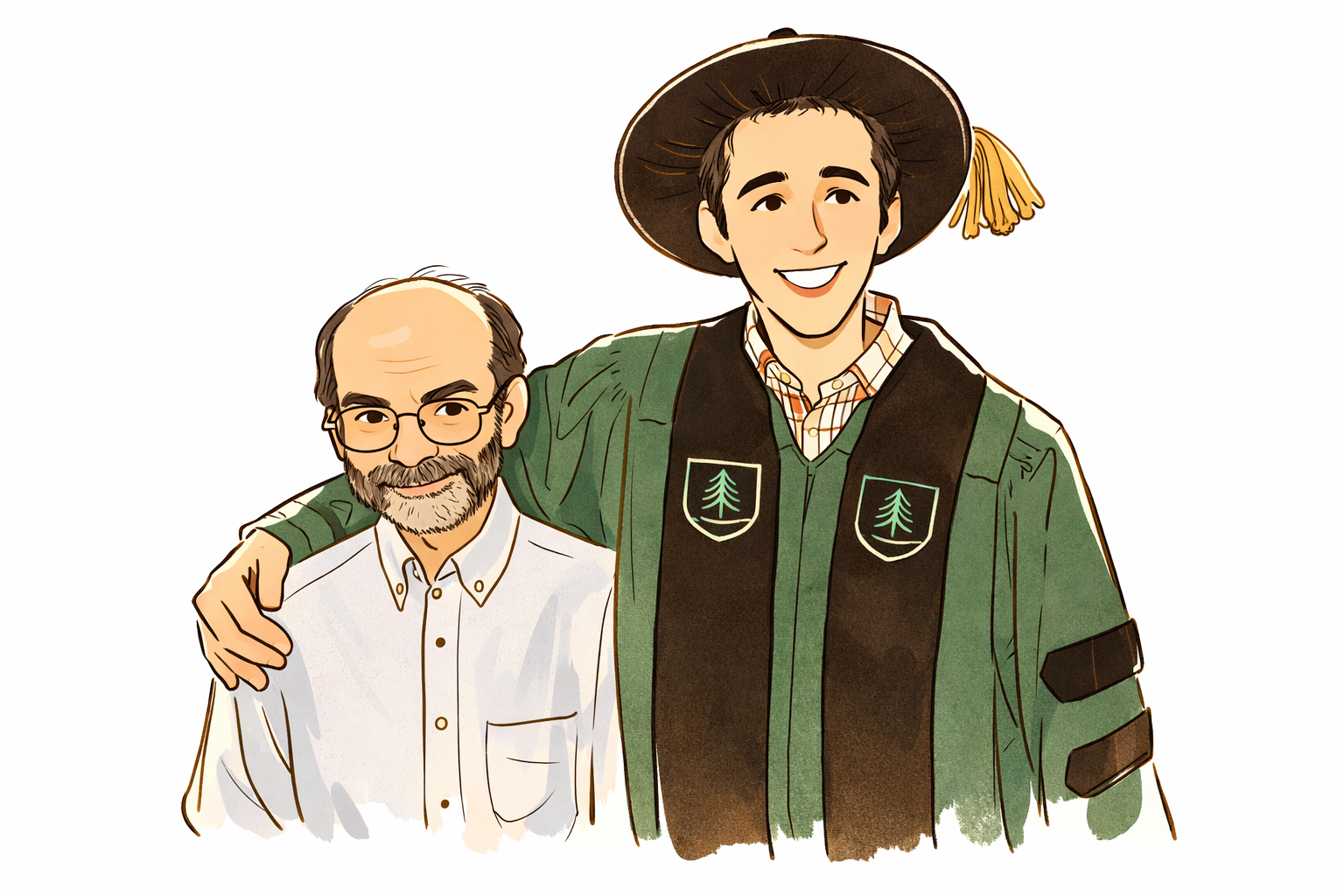
A space for my thoughts on being a scientist, principal investigator, and human being in no particular order.
Mark’s Rule: Presenting science with clarity and courage—December 2025
As I’ve been thinking more about how we teach scientific communication, I’ve also been reflecting on those who shaped the way I approach this craft. One person who comes immediately to mind is my former lab mate, Dr. Mark Schneider, whom we lost to cancer in October 2025. Mark was a senior instructor in Dr. Richard Enelow’s lab, where I completed my PhD, and he became an important mentor during my graduate training. I still remember one of my earliest interactions with him: I was giving a presentation in my Gastrointestinal Physiology course and had included a beautifully complex image of the CFTR ion channel and its function. Mark asked a simple but pointed question about one aspect of the model, and I couldn’t answer because, frankly, I hadn’t planned to discuss it. That moment stuck with me and gave rise to what I now call Mark’s Rule: if you put it on a slide, be prepared to explain it and defend it. That lesson has stayed with me ever since in seminars, chalk talks, grants, and teaching and it’s one reason I put together a short resource on presentation fundamentals, including slide design, storytelling, and fielding questions. You can find it here: Tips for Effective Scientific Presentations. I hope it’s useful, and that Mark’s Rule continues to help trainees present their science with clarity, confidence, and intention.
Application Season Survival: Passion, Prep, and a Dash of Fearlessness—August 2025
Grad school application season is upon us, and if you’re preparing your materials, it’s worth remembering that a successful application is more than grades and prestige. As an assistant professor who regularly reviews biomedical PhD applications, I often see candidates overlook what truly makes an application stand out: a clear passion for discovery, meaningful research experience, and a strong fit with the program and potential mentors. Here are some key tips to help your application shine:
Demonstrate your passion for discovery. Instead of focusing solely on GPA or course prestige, highlight experiences that show curiosity and perseverance. If you spent two years on a CRISPR project troubleshooting off-target effects, explain what drew you to the problem, how you responded to experimental setbacks, and how it shaped your scientific thinking. Depth and reflection matter more than surface-level accomplishments.
Craft a personal statement that tells a story. Avoid turning your personal statement into a CV in prose. Instead, explain why you want to pursue a PhD now, what questions motivate you, and how your experiences shaped your intellectual interests. For example, rather than listing techniques like “Western blots and immunostaining,” describe how analyzing protein expression in disease models sparked your interest in cellular signaling and disease mechanisms.
Show genuine knowledge of the labs you’re interested in. Don’t just say a lab aligns with your interests. Highlight specific findings, papers, or methodologies that resonate with your background and goals. For instance: “I was especially drawn to Dr. X’s recent paper on macrophage-derived acetylcholine in cardiac repair, particularly the finding that tissue-resident macrophages supported nerve regrowth through a semaphorin-dependent pathway. This connects closely to my interest in neuroimmune interactions and tissue remodeling, and I’m excited by the possibility of combining this with transcriptomic profiling tools I’ve worked with.”
Research experience matters a lot. Spending a year or more in the same lab shows commitment, growth, and the ability to tackle complex problems over time. Publications are valuable, but even if a first-author paper isn’t feasible as an undergrad or technician, look for ways to contribute to manuscripts, co-author papers, or write a review article. At the very least, presenting your work as posters or talks at local symposiums or national meetings demonstrates engagement and helps your application stand out.
Choose letter writers who know you well. Strong recommendations come from mentors who can speak to your thought process, growth, and problem-solving—not just your grades. A detailed letter from a postdoc or PI who supervised your daily work carries far more weight than a generic endorsement from a famous professor with little personal interaction. Make sure your letters complement your application rather than overshadow it.
Prioritize fit over reputation. Look for programs and labs that align with your scientific interests and offer the training you need. For example, if you’re passionate about immune-metabolic crosstalk, a program with multiple faculty in systems biology or translational metabolism will provide better opportunities than a top-tier program without that focus.
Prepare thoughtful questions for interviews. Whether virtual or in-person, come ready with specific questions about a PI’s projects, mentoring style, funding, lab culture, and how students shape their research directions. Similarly, ask program directors about curriculum flexibility, lab rotations, and professional development resources. Thoughtful questions show engagement and help you assess if the program is truly the right fit.
Be bold but professional. It’s appropriate—and encouraged—to ask tough questions about funding, student support, lab expectations, and alumni outcomes. This is your career, and your choice of PI and lab will shape not only your technical skills but also your scientific identity and network.
Mind the details. Small errors—like misnaming a program, referencing the wrong lab, or sloppy formatting—signal carelessness and can subtly undermine confidence in your application. Attention to detail reflects readiness for a rigorous, detail-oriented research path.
In summary: Stand out by showing curiosity, commitment, and careful thought in every part of your application, take calculated risks, be fearless in pursuing your goals, and remember that preparation, reflection, and passion will carry you far—best of luck!
The First Two Years: Lessons from the Frontlines of Starting a Lab—July 2025
Starting a lab as a new assistant professor is both exhilarating and intensely challenging. In the first two years, you're not just doing science—you’re building an entire ecosystem from scratch. You quickly become the PI, lab manager, HR department, safety officer, grant writer, and mentor, often all in the same day. Time management becomes a full-contact sport, as teaching, service, meetings, and writing deadlines compete with the day-to-day logistics of setting up protocols, ordering supplies, and mentoring trainees. Hiring is unexpectedly complex: it’s not just about finding smart people, but those who align with your lab’s values and working style. Even getting basic equipment in place can be a major hurdle—negotiating with vendors requires confidence and strategy, and you can’t be afraid to lowball, push back, or be ruthlessly clear about what you need to stay within budget. Even with a startup package or early-career award, establishing consistent funding is daunting, and the sting of triaged grants can feed imposter syndrome. Meanwhile, creating a positive lab culture—one that is inclusive, collaborative, and productive—requires daily, intentional effort. It's easy to underestimate the emotional toll: the pressure of being responsible for others’ success, the loneliness of leadership, and the endless learning curve. Yet despite the chaos, the growth is real. There’s unmatched satisfaction in building something of your own, in mentoring the next generation, and in those moments—however small—when the science works, the team clicks, and the vision begins to take shape.
On becoming a Principal Investigator—July 2023
The loneliness is real. Moving away from the benches, the white noise of the lab, the shared trainee hardship, and routine mentor meetings to the windowless office, empty lab space, and no lab members is isolating and strange. It is a combination of missing home, friends, and science that was mastered over previous years. It is also easy to get overwhelmed…suddenly negotiating all the major laboratory purchases, renovating the lab, drafting the animal protocol, managing all the bureaucratic tasks, preparing grants, hiring personnel, designing a website. This is by no means a complaint because the goal has always been to push beyond comfort into the unknown. Complacency kills, so it is only when we go past our limits that discovery is possible. And while there is frustration that all the above takes time and it will be some time for my laboratory to produce real data in this new environment, I am energized by the opportunity at hand and excited to establish new meaningful connections here. I am also fortunate to be in a department with many early stage investigators starting their own research groups and willing to provide guidance and feedback. Being the new kid on the block is not all bad either. Nobody really knows you and so it is an opportunity to be the positive change you read about on social media but were previously on the wrong rung of the academic ladder to effect. All I see is opportunity. Lets go!



